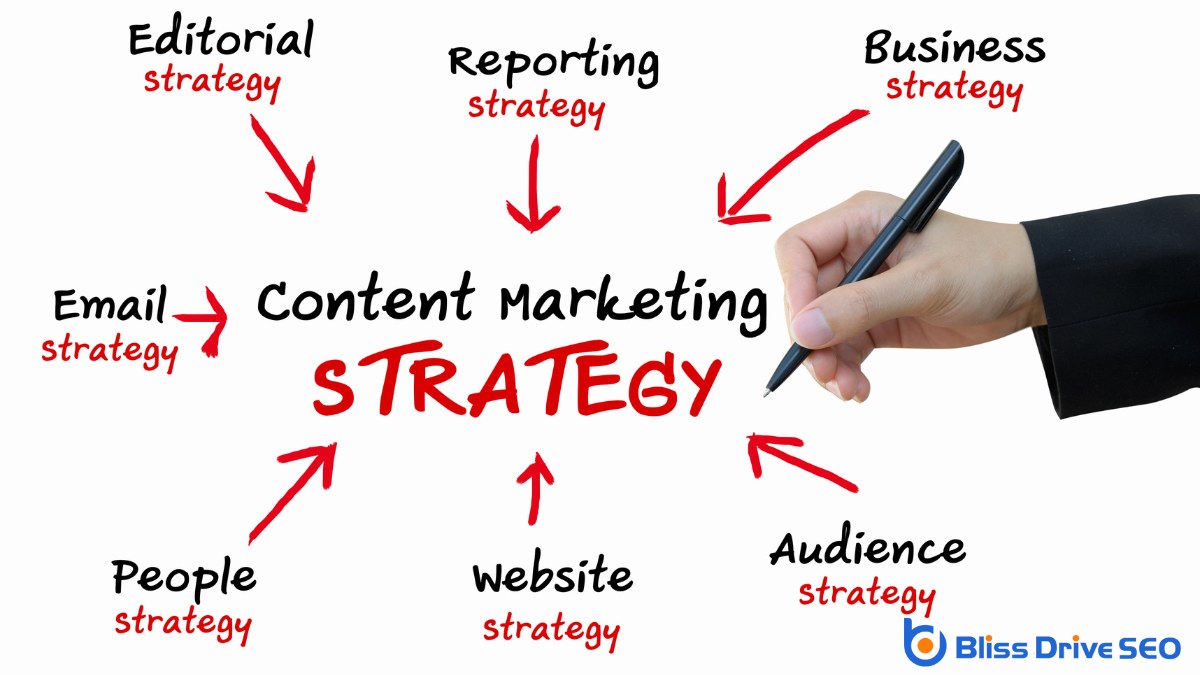Digital Marketing Services
Learn More About Us

Content marketingA strategic approach focused on creating and distributing valuable, relevant, and consistent content... means consistently creating and sharing valuable content to attract and retain a specific audience. You're using it to build trust and address your audience's needs by providing relevant information. The aim is to establish a strong, loyal relationship with them. Success requires understanding your target audience, using storytelling, and employing varied formats like articles, videos, and interactive contentContent that requires user interaction, such as quizzes, polls, or calculators.. It boosts brand awarenessThe extent to which consumers are familiar with the qualities or image of a particular brand., improves SEO, and is cost-effective compared to traditional advertising. If you want to create content that resonates and drives results, exploring content marketing strategies will be beneficial.
To truly grasp content marketing, it's pivotal to recognize it as a strategic approach focused on creating and distributing valuable, relevant, and consistent content to attract and retain a clearly defined audience. Content marketing isn't just about selling a product; it's about building trust and providing solutions to problems your audience faces. By understanding their needs, you can craft content that resonates with them, ultimately fostering a loyal relationship.
Think of content marketing as a conversation you're having with your audience. Instead of bombarding them with advertisements, you're offering insights, answering questions, and encouraging engagementThe interactions that users have with a brand’s content on social media.. This approach positions you as an authority in your field, making your audience more likely to turn to you when they need a solution.
Your goal is to become a trusted source of information, creating content that not only informs but also inspires action. Whether it's blog posts, videos, or social media updates, the content should reflect your brand's voice and values. By doing so, you create a connection that goes beyond transactions, establishing a community where your audience feels valued and understood.

A successful content marketing strategy hinges on several key elements that work together to engage and retain your audience.
First, you need to define your target audience clearly. Understand who they are, what they need, and how your content can meet those needs. This insight will help shape your content's tone, style, and subjects.
Next, focus on creating high-quality, valuable content. Your audience should find your content informative, entertaining, or both. It's not just about filling space; it's about delivering real value that keeps them coming back for more.
Consistency is also vital. Regularly publishing content keeps your audience engaged and establishes your brand as a reliable source of information.
Don't underestimate the power of storytelling. Craft narratives that resonate with your audience on an emotional level. StoriesA feature on platforms like Instagram and Facebook where users can post photos and videos that disap... create connections and make your content memorable.
Additionally, utilize various content formats like blogs, videos, infographicsVisual representations of information, data, or knowledge intended to present complex information qu..., and podcastsAudio content distributed through digital channels, often in series format. to cater to different preferences and learning styles.
Lastly, include a strong call to action. Guide your audience on what to do next, whether it's subscribing, sharing, or purchasing. Each piece of content should have a purpose, driving your audience towards a desired outcome.
Implementing a content marketing strategy isn't just about maintaining an engaging dialogue with your audience; it also offers significant advantages for businesses. By focusing on delivering valuable, relevant content, you can enhance your brand's visibility and authority, driving growth and customer loyaltyThe likelihood of customers to continue purchasing from a brand over time.. When you consistently provide information that resonates with your audience, it helps establish trust, which is vital for building long-term relationships.
One of the primary benefits is increased website traffic. As you produce high-quality content, it attracts more visitors through search engines and social media shares. This, in turn, can leadA potential customer referred by an affiliate who has shown interest in the product or service but h... to higher conversion rates as potential customers find value in your offerings. Additionally, content marketing can be cost-effective compared to traditional advertising methods, giving you a greater return on investment.
Here are some key benefits that content marketing offers your business:
To create effective content strategies, focus on understanding your target audience and ensuring your brand's messaging remains consistent. By analyzing the needs and preferences of your audience, you'll tailor content that truly resonates.
Consistent messaging reinforces your brand identityThe visible elements of a brand, such as color, design, and logo, that identify and distinguish the ..., making it more recognizable and trustworthy to your audience.
Understanding your target audience is essential for crafting effective content strategies that resonate and engage. When you know who you're talking to, you can tailor your messages to meet their needs and interests, making your content more relevant and impactful. Begin by identifying the demographics, interests, and behaviors of your audience. This insight helps you create content that speaks directly to them.
To conduct a thorough target audience analysis, consider utilizing various tools and methods. Surveys and feedback forms can provide direct insights from your audience. Social media analyticsThe process of gathering and analyzing data from social media platforms to inform business decisions... reveal what content your audience engages with most. Google AnalyticsA web analytics service offered by Google that tracks and reports website traffic. can help track how users interact with your website, providing valuable data on their behavior. Additionally, studying your competitors' audiences can uncover gaps in your content that you can fill.
Here's how you can get started:
Having a clear understanding of your target audience lays the groundwork for maintaining consistent brand messagingThe communication and language used to convey a brand's values, benefits, and personality.. When you're aware of who your audience is, you can tailor every message to resonate with them, ensuring it aligns with their values and needs.
Consistency in your messaging doesn't just mean repeating the same phrases; it involves creating a unified voice and tone across all your content platforms. This helps in building trust and recognition, making your audience more likely to engage with your brand.
Consistency also requires you to stay true to your brand's core values. Every piece of content should reflect your brand's mission and vision, helping to reinforce your identity in the minds of your audience. This means every blog post, social media update, and email should echo the same principles.
Moreover, consistent brand messaging helps you differentiate yourself from competitors. When your audience clearly understands what you stand for, they're more likely to choose you over others.
Make sure to regularly review your content strategyA plan for creating, publishing, and managing content to meet business goals. and adjust your messaging to reflect any changes in market trends or audience preferences, ensuring you remain relevant and consistent.

Grasping the effectiveness of your content marketing efforts hinges on measuring success accurately. You need to know what works and what doesn't so you can fine-tune your strategy. Start by defining clear objectives. Are you aiming to increase brand awareness, generate leads, or drive sales? Once you've set these goals, you can identify key performance indicators (KPIs) that align with them.
Engage with these insights to understand your content's impact:
Regularly review these metrics to spot patterns and trends. This helps you understand what resonates with your audience and what needs improvement.
As you continue to refine your content marketing strategy through measuring success, it's equally important to keep an eye on emerging trends. One significant trend is the increasing use of artificial intelligence (AI) in content creation and personalizationTailoring content and offers to individual users based on their behavior, preferences, or demographi.... AI can analyze vast amounts of data to generate content tailored to your audience's preferences, enhancing engagement and improving the customer experience.
Another trend is the rise of interactive content. Audiences crave engagement, and interactive elementsElements that require user interaction, such as buttons, forms, and sliders. like quizzes, polls, and interactive infographics can boost user participation and keep them on your site longer. This type of content not only entertains but also educates, creating a more memorable experience.
Video content continues to dominate, but short-form videos are particularly gaining traction. Platforms like TikTokA social media platform for creating, sharing, and discovering short music videos. and InstagramA photo and video-sharing social networking service owned by Facebook. Reels highlight the effectiveness of concise, impactful storytelling. Focus on creating short, dynamic videos to capture your audience's attention quickly.
Lastly, sustainability and corporate responsibility are becoming increasingly important. Consumers prefer brands that demonstrate genuine concern for the environment and social issues. Incorporating these values into your content can build trust and loyalty, setting you apart from competitors. Embrace these trends to keep your content marketing strategy relevant and impactful.
In content marketing, you create and share valuable content to engage and build a loyal audience. By focusing on key elements like storytelling and SEO, your business can reap benefits like increased brand awareness and customer trust. Developing effective strategies and measuring success guarantees you're on the right track. Stay ahead by keeping an eye on future trends to adapt and grow. Embrace content marketing and watch your business thrive in this ever-evolving digital landscape.
